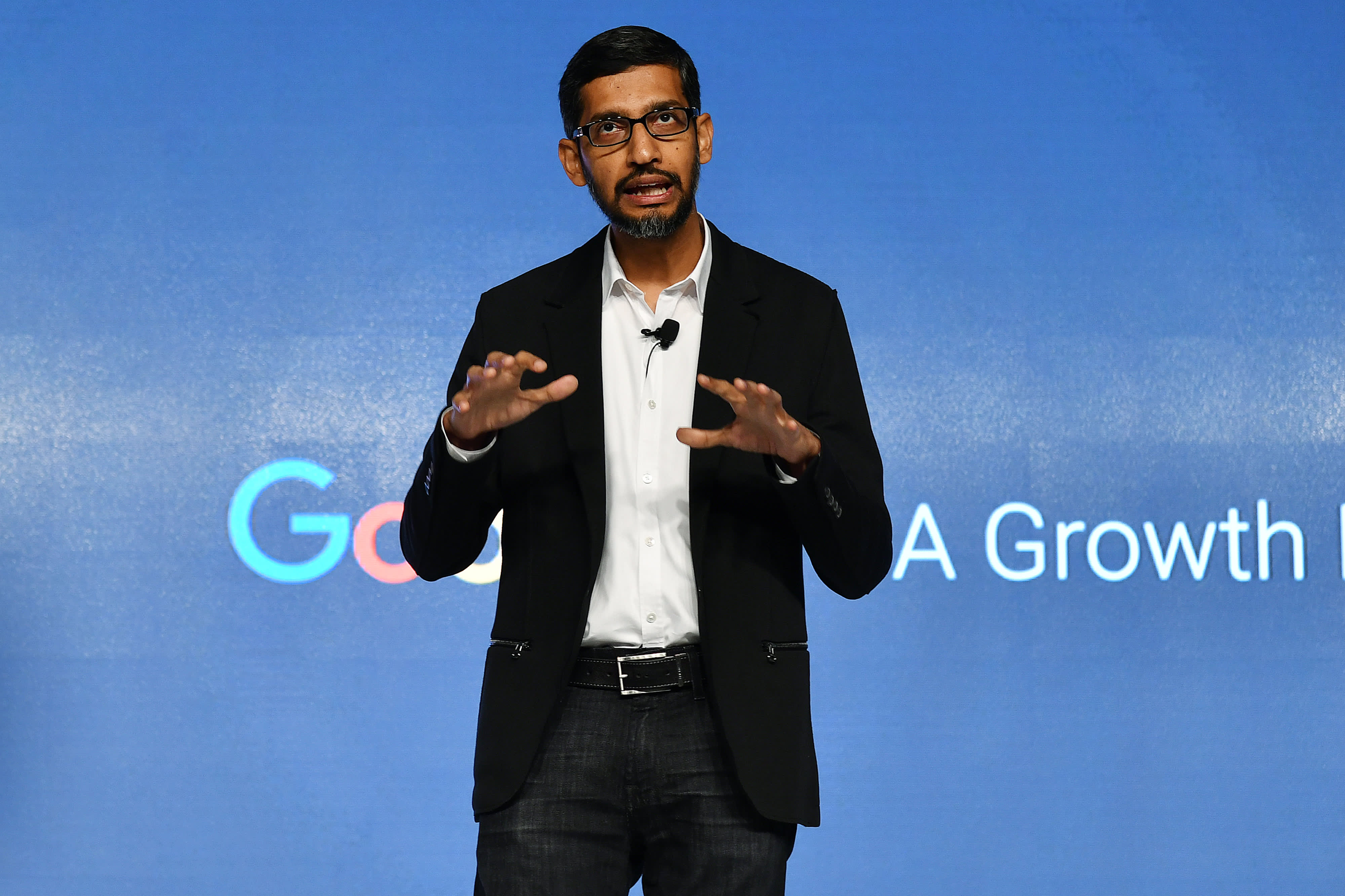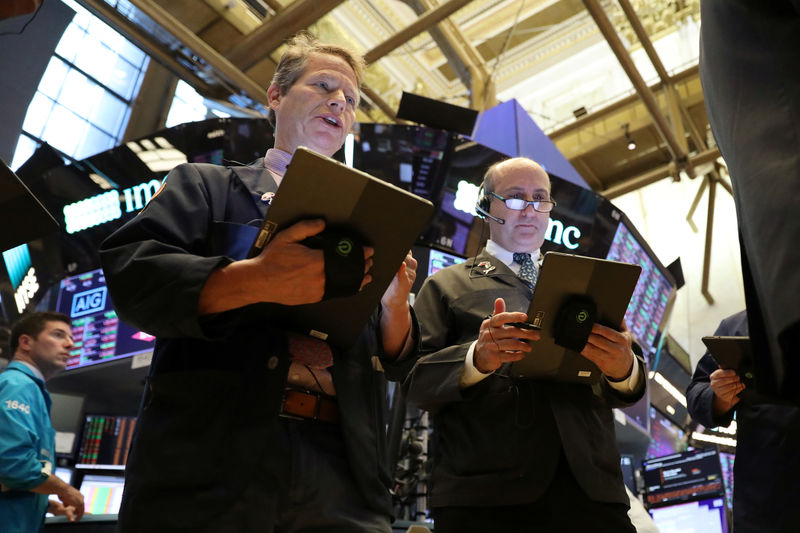
Google CEO Sundar Pichai testifies during a House Judiciary Committee hearing on Capitol Hill in Washington, DC, December 11, 2018.
Saul Loeb | AFP | Getty Images
Wall Street analysts were largely caught off guard after Alphabet posted a rare revenue miss in its earnings report on Monday after the bell and they were still confused after the results. Analysts noted a slowdown in advertising revenue growth and repeated calls for the company to be more transparent in its earnings report.
Shares plunged more than 7% in premarket trading.
"This quarter will no doubt result in a reset to forward expectations, particularly for the ads business, as investors search for reasons for the fairly meaningful deceleration – we expect the stock to trade sideways while we all grapple with whether this quarter was simply a result of product change headaches or if ad budgets are shifting elsewhere," Nomura Instinet analyst Mark Kelley said.
"We side with the former and maintain our Buy rating, though calls for more disclosure to help us all with these questions were once again a main theme, and with good reason," the analyst added.
Google revenue increased 17%, slower than the 28% pace a year earlier. Advertising sales increased 15%, compared to a 24% growth rate a year ago. Alphabet executives said on the call that the slowdown was due to currency fluctuations and timing of product changes but analysts apparently wanted more.
The parade of transparency calls continued with analysts at J.P. Morgan. "Overall, we expect GOOGL shares to be under pressure in the near-term given sub-20% revenue growth & downward earnings revisions. As noted above, the exact drivers of GOOGL's slowing topline are unclear, & we believe frustration around GOOGL's lack of transparency will only increase," they said.
Revenue deceleration was enough for analysts at Stifel who downgraded the stock to hold from buy. "The unexpected degree of revenue deceleration and lower visibility into the near-term reacceleration / deceleration potential lead us to believe the multiple on shares may be challenged to move meaningfully higher over the next twelve months," wrote Stifel analyst Scott Devitt.
"Hey Google, What Happened To Revenue Growth?" asked RBC analyst Mark Mahaney in his earnings wrap note to clients.
Still, he said, "we're modest buyers on the 7% AM pullback; we'd be material buyers on a material pullback. We don't believe GOOGL is going through a material, sustained growth deceleration."
Here's what major analysts are saying about Alphabet:
Stifel- Downgraded to hold from buy
"We view shares as fairly-valued at current levels and believe the multiple is likely to remain range bound over the next twelve months as a potential deceleration digestion period lies ahead with lower visibility into near-term revenue growth rates. The upside to Street margin in 1Q would be an encouraging trend all else equal, though the topline deceleration path and questions regarding Alphabet's long-term revenue growth trajectory are likely more meaningful to intermediate-term stock performance in our view, while discretionary spending could also cause opex to tick up again in future quarters. At aftermarket prices, GOOGL shares trade at approximately 22x our 2020E GAAP EPS, matching the three-year historical average of 22x forward two-year EPS."
Goldman Sachs- Buy rating and price target to $1,350 from $1,400
"Despite upside to GAAP EPS excluding the EU fine, Alphabet shares will likely be under pressure as Sites revenue growth on a constant currency basis came in below 20% for the first time since 1Q15. While a bigger FX headwind was clearly a key reason for the shortfall, management cited the timing of ad product changes as another factor that in some quarters are cited as tailwinds but this quarter was cited as hurting revenue growth. The focus will now turn to 2Q19 results and whether or not net ad growth will reaccelerate."
Barclays- Overweight rating and price target to $1,315 from $1,350
"Google missed every revenue line by 1.5%-4% for 1Q, and we were below consensus. We have to imagine that some of the deceleration is deliberate around product changes, and some is Google resetting the bar. Network trends are likely to get worse as Yahoo and AOL drop out of AFS going forward."
J.P. Morgan - Overweight rating and price target to $1,310 from $1,250
"Overall, we expect GOOGL shares to be under pressure in the near-term given sub-20% revenue growth & downward earnings revisions. As noted above, the exact drivers of GOOGL's slowing topline are unclear, & we believe frustration around GOOGL's lack of transparency will only increase. That being said, GOOGL has maintained 20%+ growth for a very long time—off a large base—and now represents roughly 1/3 of the global online ad market. It also faces increased advertising competition from AMZN, at least on the margin. Our 2019/2020 revenue & GAAP EPS all come down about 2% as improved Other Bets losses partly offset slower Google Segment revenue growth. We maintain our Overweight rating, but prefer other FANG names Facebook, Amazon, & Netflix to Google."
Nomura Instinet- Buy rating and price target to $1,300 from $1,310
"This quarter will no doubt result in a reset to forward expectations, particularly for the ads business, as investors search for reasons for the fairly meaningful deceleration – we expect the stock to trade sideways while we all grapple with whether this quarter was simply a result of product change headaches or if ad budgets are shifting elsewhere. We side with the former and maintain our Buy rating, though calls for more disclosure to help us all with these questions were once again a main theme, and with good reason. We're slightly lowering our forward outlook and our target price moves to $1,300."
Morgan Stanley- Overweight rating and price target to $1,425 from $1,500
"GOOGL's 1Q ex FX Websites revenue came in 1% lower than our estimate…growing 19% Y/Y, the first time GOOGL has grown ex FX less than 20% in 17 quarters (Q3:14). GOOGL pointed to "the timing of product changes in ads" as one of the factors that drove the growth deceleration…but didn't provide any more clarity around what the changes were, whether the impact will be linear by quarter, or whether there will be more changes to come. The fact is we aren't sure what changes GOOGL made in the quarter that drove the deceleration and this is something the Street must figure out. While EBIT, EBITDA, and FCF were all stronger than expected, the forward growth trajectory of Websites revenue (given the scale and leverage in this ~$100bn annualized business) is likely to remain top of mind to determining long-term valuation."
RBC- Outperform rating
"We're modest buyers on the 7% AM pullback; we'd be material buyers on a material pullback. We don't believe GOOGL is going through a material, sustained growth deceleration. 1) The TAM remains $1T+ in global advertising/marketing spend. 2) Based on our extensive survey work, we don't see evidence of changes in Marketers' view of Google – budget allocations, future spend intentions, or perceived ROI (absolute or relative). And 3) We believe GOOGL's investments in Cloud, Internet-connected Homes & Autonomous Vehicles help set the company up for more years of premium growth & profits. And valuation remains reasonable, in our view, at ~20x Core Google '19E GAAP EPS, adjusting for cash."
Bank of America- Buy rating
"Revenue decelerated more than expected, while several peers exceeded expectations (though FB ad growth decelerated 220 bps q/q, much like Google ads) and we would expect Google stock to give back some of the recent gains (stock has rallied from $1,200 in early April, vs S&P index up 4%). Looking forward, while tougher comps may continue to impact 2019 ad revenues, Google could also introduce improvements which could accelerate revenues. While we are disappointed by below-Street revenue (and Google could avoid some stock volatility with better disclosure), we continue to be optimistic on medium-term benefit from machine learning on ad targeting, revenue potential driven by new investments (Google cloud and Waymo) and relatively undemanding core Google valuation. We maintain our Buy rating. Potential catalysts from here include: 1) new products (hardware) at Google I/O on May 7th; 2) YouTube news from upfront; and 3) visibility on Google Cloud or Waymo."
Deutsche Bank- Buy rating and price target to $1,300 to $1,385
"We appreciate quarterly results can be volatile and acknowledge the company's long-term focus, but the magnitude of the deceleration on a constant-currency basis marked the largest sequential move down since 3Q12. Given the magnitude of the change here, particularly given the consistency of growth rates historically, we think Google did a poor job explaining the slow-down. While the CFO flagged timing uncertainty last quarter, the comments were so opaque as to render them meaningless to most investors rather than a proper warning that top line growth would slow. In addition to the sharp deceleration, with gross ad revenue approaching $154B at Google in 2020, combined Google + Face-book ad revs of $237B in 2020 is on track to cross 40% of the global ad market by our estimates. Given slowing growth and rising penetration, we see saturation fears coming back to the fore on Alphabet shares. We reduce our total sites revenue ex-FX in 2019 to 18% (from 20.7%) and reduce our target price to $1,300 (from $1,385 previously) reflecting lower estimates and slightly lower multiples."
UBS- Buy rating
"After a Q4 earnings call message of potential volatile ad revs due to product changes, GOOG's Q1 '19 earnings report reflected that message (our conservative modeling was not enough) US/Europe ad revs decelerated worse than expected (our initial take is that trend is driven by supply/clicks as opposed to demand). Mgmt framed tough YoY comps (we think referencing YouTube product strength from year ago as headwind to volumes) & emphasized that no one product change caused such a headwind. We take a more modest approach to ad revs growth in 2019 to conservatively frame tough comps and/or potential product changes as we attempt to correctly frame the headwind. Leaving aside the short term debate (as a stock overhang), we still see GOOG as a key long term holding and nothing in this quarter changes our view on the structural drivers of revenue growth and FCF generation (AI/machine learning, local advertising, media consumption, cloud computing, hardware & Other Bets) – especially at what we see as a reasonable absolute valuation when measured against growth."
https://www.cnbc.com/2019/04/30/alphabet-stock-slammed-as-analysts-cite-lack-of-revenue-growth-and-transparency.html
2019-04-30 11:21:40Z
52780278414517




